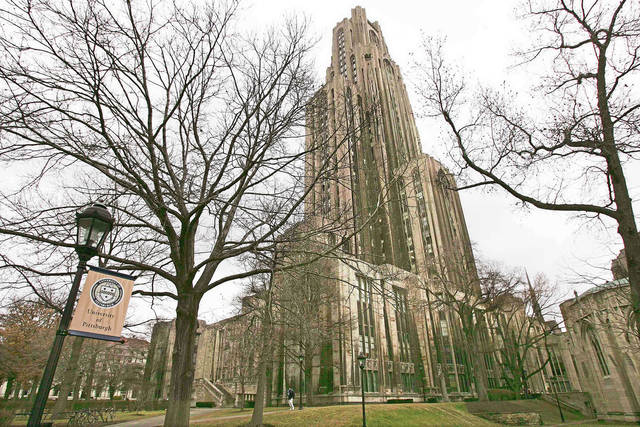The University of Pittsburgh has suspended a language program sponsored by the Chinese government in the wake of visa issues for 15 Chinese scholars previously scheduled to oversee the program.
The school suspended its Confucius Institute language programs after the U.S. State Department issued “unwelcome and unexpected” guidance regarding the visas of the Chinese scholars who were scheduled to travel to Pittsburgh this fall to operate the program, said Ariel Armony, Pitt’s vice provost for global affairs and director of the University Center for International Studies.
A Pitt spokesman said the university was informed it was out of compliance with J-1 visa regulations regarding interns at the Confucius Institute and was not able to make modifications in time for the fall semester.
Belkys Torres, executive director of global engagement at Pitt, said the university’s legal team is in discussions with the State Department regarding its visa issues.
Although the language program has been suspended for the year, Torres said Pitt’s Confucius Institute continues to offer a variety of Chinese cultural activities and programs.
Since 2007, the institute has provided Chinese language instruction to students at schools and colleges in Pennsylvania and surrounding states. It is among about 100 Confucius Institutes that have opened since the Chinese government sponsored its first program at the University of Maryland in 2004.
The abrupt suspension of the program at Pitt forced officials at the Pitt Greensburg campus and Saint Vincent College to make last-minute adjustments to their course schedules. Pitt Greensburg canceled three Mandarin language classes scheduled to be taught by Confucius Institute scholars. A spokesman for Saint Vincent said the college, located near Latrobe, contracted with an adjunct instructor to staff an elementary-level Mandarin class scheduled to be taught by a Confucius Institute scholar.
Pitt’s action came amid growing concern across U.S. higher education institutions about increasing government scrutiny of international relations at colleges and universities.
Last year, FBI Director Christopher Wray told Congress that Chinese operatives were active on university campuses across the country and said the FBI was monitoring Confucius Institutes at several unnamed universities.
In January, Inside Higher Ed reported that at least 10 universities had closed Confucius Institutes under growing concerns both in Congress and the Trump administration that associated the institutes with foreign intelligence threats.
This year, the New York Times reported the FBI had launched an effort to bar Chinese scholars suspected of being linked to intelligence agencies from entering the U.S. and canceled the visas of as many as 30 of them.
A spokesman for Pitt said officials know of no other scholars who have been barred from traveling to the university.
Spokespersons for the Confucius Institute U.S. Center and the State Department did not respond to calls for comment.
Defending the program
Pitt officials are pushing back against concerns about the university’s international relations.
Armony said Pitt’s Confucius Institute provided a boost to schools and colleges struggling with cutbacks in language instruction.
“Since 2007, more than 36,000 students in Pennsylvania, Ohio and New York have benefited from the program, and the foreign language program for rural and suburban schools has created a conduit to the broader world and provided opportunities for social mobility through language acquisition,” Armony said.
He said the Confucius Institute helped to launch permanent Chinese language programs in 28 school districts in 22 counties.
Pitt is committed to working to strengthen international engagement even as it suspended its Confucius Institute language programs, Armony said.
His comments are similar to those Pitt Chancellor Patrick Gallagher wrote in a letter released to the university community last month after he told trustees he is committed to maintaining the school’s international partnerships.
In the letter, cited in Pitt’s University Times, Gallagher warned that a “rising tide of fear” is threatening international collaboration among scholars and institutes.
“Collaborations between scientists across national boundaries have been subject to unprecedented scrutiny. Established practices have been prohibited on technicalities. And researchers, particularly immigrants and visitors from China, have been the target of aggressive investigations and public sanctions,” Gallagher wrote. “At Pitt, our mission demands better — and so does our university community.”
China connection
Pitt maintains a variety of partnerships with multiple Chinese schools, including Sichuan University, Tsinghua University, Capital Medical University, Renmin University and others. The programs provide educational and training opportunities in engineering, medicine, nursing, social sciences and other disciplines.
A Pitt spokesman said those programs and partnerships remain strong and intact as does Pitt’s Asian Studies Center.
Pitt’s ties to China have strengthened in recent years, as has its popularity among students from China who are studying here.
Last year, the public research university enrolled 2,056 Chinese students. They made up the largest segment of Pitt’s 3,400 international students.
Chinese enrollment at Pitt has grown dramatically since 2009, when the school listed 489 students from China among its international students.
Recent reports from nearby Carnegie Mellon University cited about 2,800 students from China among its international student population in 2017-18, while 182 students from China were enrolled at Duquesne University.








